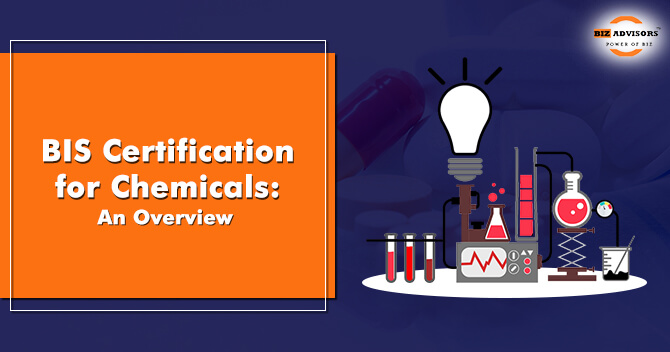The government stated in June 2020 that BIS Certification is now required for the manufacture and import of chemical products. You are no longer allowed or permitted to export your products to India if you are a foreign or overseas manufacturer and have not finished or got BIS Certification before December 13, 2020. The so-called 2023 Plan of the Prime Minister of India is in line with the expansion of the required BIS Certification for Chemicals. Through significant expansions of the BIS Certification laws, the Government of India has already been pursuing the objective of confirming the security, integrity, and excellence of the items available in the market as of 2019. Therefore, it is anticipated that in the upcoming years an increasing number of products or commodities will be subjected to an obligatory Certification. Primarily, this blog post has been wholly dedicated to a detailed analysis of the BIS Certification for Chemicals.
What is BIS Certification for Chemicals?
BIS Certification is typically essential for product importing and enables the Certificate holder to provide clients with a third-party guarantee of the product’s security, integrity, and consistency. Although the Certification was previously optional, the Government of India made it so for several goods or things. The ISI mark, which indicates that the product complies with the Indian Standards set by the BIS or Bureau of Indian Standards, may be used on products by a licensee which holds the BIS Certification for Chemical Products or any products.
The Authorities which issue BIS Certification for Chemicals in India
The Bureau of Indian Standards, also known as BIS, is responsible for issuing BIS Certification for Chemicals in India. It is a National Standards Body that was created to enhance and encourage the nation’s standards movement. After executing a safety test on the item or product by the established Indian Standards and receiving the necessary documentation, the BIS issues this certificate.
Utilization
Following are the points which reflect the use of BSI Certification for Chemicals in a broader way:-
- Being a National Standards Body in India, the Bureau of Indian Standards upholds high standards of product integrity, reliability, and security.
- To test product samples during initial inspections and surveillance operations, BIS has established a Central Laboratory, 4 Regional Laboratories, and 3 Branch Laboratories across the nation.
- In addition to their labs, the Bureau of Indian Standards, also known as BIS, certified a substantial number of testing facilities to analyze samples collected by BIS Officers.
- In the interest of protecting public health, safety, and life, the Indian government has declared several products to be subject to mandatory BIS Certification.
- Before they can produce, store, utilize, or transport the specified chemicals, domestic and foreign enterprises will need to obtain a BIS Certification for Chemicals under the execution of Quality Control Orders for a new set of Indian Standards for various chemicals.
A Factory Evaluation is required for Chemical Manufacturers to receive BIS Certification
There are three different BIS Certification types, which you can review below:-
- Necessary BIS Certification without Factory Checking;
- Compulsory BIS Certification with Factory Checking; and
- Optional BIS Certification
The most recent additions to the list of chemical products or objects are within the first category of certification. This implies that to sell, produce, and supply chemicals in India, domestic and outside producers must have permits. For both, a factory inspection is required, making it a very time-consuming procedure that producers must start as soon as feasible.
The chart displaying the 14 chemical compounds that now require new BIS Certification follows:
Chemical Product Identification
- IS 16112: 2013 Beta Pico line
- IS 8058: 2018 Pyridine
- IS 16113: 2013 Gamma Pico line
- ID 297: 2001 for sodium sulfide
- Sodium Carbonate IS 7129: 1992
- IS 170: 200 Acetone
- IS 2080: 1980 Hydrogen Peroxide
- 2018 IS 12084 for morpho line
- IS 11657: 1986 Phosphorus Oxy-chloride
- IS 6100: 1984 Sodium Tripoli phosphate
- Sulf oxalate of Sodium Formaldehyde IS 4505: 2015
- IS 11744: 1986 Phosphorus Penta chloride
- Barium Carbonate That Has Precipitated IS 3205: 1984
- IS 4581: 1978 Phosphorus Trichloride
Procedural Format for obtaining BIS Certification for Chemicals
Below mentioned is the procedure for BIS Certification for Chemicals:-
- All foreign suppliers and local producers of these goods will be required to submit an application for BIS Certification for Chemicals to the relevant BIS Office upon notification of such Quality Control Orders.
- Physical testing and verification of the relevant chemical within the factory’s confines and independent testing of the same by a BIS own laboratory/accredited lab in India are all part of the BIS Registration procedure.
- Initial certification can be obtained for a term of one year, following which a request for BIS certification renewal for another period of one to five years must be made.
- The Indian Standards are being looked at for potential enhancements or modifications for several polymers and chemicals that already fall under the purview of BIS.
- These substances include butyl acetate, ophthalmic anhydride, ethylene glycol, acetone, and toluene.
BIS Update on Extending Essential Certification for Additional Chemical Products
The Indian government stated that the date on which the current Quality Control Orders for certain chemical products would go into effect till March 10, 2022. Now that they have more time, manufacturers of these products can obtain BIS Certification for Chemical Products.
The compounds that have been prolonged are as follows:
Date of Efficacy concerning Products
- ABS or Acryl nitrite-Butadiene-Styrene (Sep 12, 2022)
- Dichloride ethylene (Sep 12, 2022)
- Extruded polystyrene (Sep 12, 2022)
- The monomer of vinyl chloride (Sep 12, 2022)
Conclusion
A BIS license is mandatory to guarantee the quality of the goods and to use the standard mark on the product. All chemical producers are required to acquire a BIS Certification for Chemicals from the Bureau of Indian Standards[1] to sell their goods in the Indian market. Because it involves documentation, laboratory analysis, factory observation, and other processes, the BIS certification process is more complicated than it first appears. It is suggested that you should seek to get appropriate advice from a professional to obtain BIS certification. Seek expert advice for BIS Certification for Chemical. You can also reach an expert at Bizadvisors.io for more information.
Read our article:What is the importance of BIS Certification in India
 9559179325
9559179325 9559179325
9559179325





